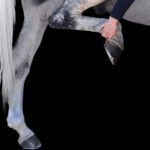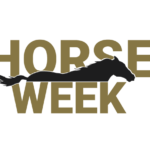Markopoulo, Greece, August 21, 2004–The U.S. upped its Olympic medal count dramatically Saturday, taking a team bronze in grand prix dressage and being awarded the team bronze after the fact in eventing, based on a ruling from the Court of Arbitration for Sport (CAS).
Where to begin explaining all this to you? I guess I’ll start with the eventing switcheroo, which also means Kim Severson got the individual silver rather than the bronze that was hanging around her neck when she left Greece last week.
It was like World War II all over again when France (which stood to gain the gold medal) filed an appeal to the CAS with Britain and the U.S., seeking to have Germany’s two eventing gold medals redistributed to more deserving countries.
As I’ve been telling you for the past few days, the three countries involved felt Bettina Hoy, the German individual gold medalist, should be penalized for crossing the starting line twice in the eventing show jumping phase. She blamed confusion over a scoreboard clock that was restarted by mistake.
Since it was a management error, an appeals jury overruled the ground jury that had penalized Bettina on the night of the event. That caused a Three Stooges-inspired juggling of the placings, with Germany initially announced as the winner; then France going up to No. 1 in the rankings, only to be replaced by Germany.
The CAS today said the appeals jury had no standing to overrule the ground jury, so Bettina was tagged with 14 penalties and will have to give back her gold medal. Her downfall also was that of the German team, which sank to fourth as France once again was elevated, we hope permanently this time, to first. The Brits are second and the USA, which had been fourth, moved up to a bronze.
By the way, since he started with the team as coach in 1993, Mark Phillips has never brought the squad home from a major championship without a medal, so perhaps this was fated.
Leslie Law, the excellent British rider who did a great job with that silver streak, Shear L’Eau, in the show jumping, gets a well-deserved individual gold. Bronze goes to Pippa Funnell, his teammate, who had been fourth.
Bringing this case was controversial, because both the German team and Bettina rode well (aside from her starting line mishap). So I talked it over with David O’Connor today. You know him best as the 2000 Olympic gold medallist, but his main role now is as president of the U.S. Equestrian Federation (USEF).
He told me Bettina’s penalty situation should have been addressed before the next rider came in the ring. The USEF is disappointed in the way the FEI (international equestrian federation) handled the situation.
He emphasized that when the Allies decided to pursue their case, it was “not about Bettina or the German team. The problem is what it leads to if you open the door (on ignoring a violation of the rules); someone’s going to drive through it.”
David added that while “the cost of this is very high, what’s the price of integrity of sport? We believe the ground jury should be in control of a decision on the field of play.”
How the medals will be awarded is a question mark. John Long, the USEF’s CEO, said his organization will be looking to the U.S. Olympic Committee to see how to handle it. I think he’d prefer to have the athletes honored at the Games, though they’ve all gone home now.
“Logistically, it would be a challenge and expensive, but how many times do you get to stand with a medal around your neck at the Olympics?” he asked me. “If there’s any way we can pull it off, I’d love to be able to do it.”
My guess is that there will be a simple ceremony elsewhere, perhaps at a big event where most of the team members are present. England’s Burghley event next month comes to mind, but no one has called to ask my opinion yet.
Enough of the eventing. On to the dressage. The saying “under-promise and over-deliver” is a good motto to live by. So it was a recipe for disappointment when talk started earlier this year about the U.S. possibly upsetting Germany for the gold. It didn’t happen–it didn’t even come close to happening.
This is the sixth time in a row that Germany has won the Olympic dressage gold, and while they may not be as strong as they once were, they’re still pretty hefty.
The U.S., meanwhile, has had a difficult year. Two of our best horses, Brentina, ridden by Debbie McDonald, and Relevant, Lisa Wilcox’s mount, had physical problems in the spring. Meanwhile, Guenter Seidel was riding the relatively inexperienced horse Aragon. Things went downhill when the team got here.
Lisa Wilcox had to go first before the judges had a chance to warm-up in a sense and get into the scoring swing of things. Jessica Ransehousen, the dressage team’s chef d’equipe, blames herself for drawing the U.S. first in the order of go. That’s ridiculous, of course, but while it wasn’t anyone’s fault, it sure didn’t help.
So as I told you yesterday, Lisa and Guenter didn’t get the scores they’d hoped for or even what many felt they deserved. That meant all hopes were riding on petite Debbie today. She put in a beautiful test, with just a little bobble in the transition from the first pirouette. But Brentina was light and lithe, a prima ballerina. So her score of 73.375 was disappointing.
“It was the ride of her life, but only some of the judges got that it was the ride of her life,” Robert Dover said sarcastically after Debbie’s brilliant performance that brought tears to my eyes.
Three judges scored Debbie at 73 percent or more, with Stephen Clarke, president of the jury, giving her a 75. Vincenzo Truppa, the judge from Italy, only gave her a 71.875, however, while the influential Mariette Withages awarded her a 72.292. (Scores of the five judges are averaged to produce a total.)
During the press conference after the medal presentation, Mariette seemed to indicate Brentina is not one of her favorites.
“It’s one of the best and most correctly-ridden horses, but sometimes it misses the sparkle and power of other athletes,” she said. So she prefers football players to prima ballerinas, I guess. She could produce quite an interesting version of Swan Lake with that mindset.
Leading the way for the individual honors, which will be contested next week in the special and the musical freestyle, is — SURPRISE — Ulla Salzgeber and Rusty, with a whopping 78.208. This horse has been at or near the top of the heap for the last few years.
His piaffe is not pretty, but he does a nice pirouette, and his canter is great. If Mariette can have favorites then so can I, and he’s not one of mine.
Rusty led the Germans to a sound victory, with 74.653 percent over Spain, which had 72.917. The Spanish showed their progress with a bronze at the World Equestrian Games in 2002, and they’ve only gotten better. They’re charming too, especially Rafael Soto and Beatriz Ferrer-Salat, who rides Beauvalais, the only non-Andalusian on the team. Beatriz stands second with 74.667 percent. (She and the Spanish were among my medal picks in Practical Horseman, by the way. Had to brag.)
The U.S. total was 71.500 percent, just a whisker in front of the Netherlands, with 71.264. If Edward Gal’s impressive Lingh was here instead of at home in Holland after a problem stepping off a van, I think the Dutch would have stolen the U.S. medal.
Holland’s star, Anky van Grunsven, did not have the best ride with the still relatively inexperienced Salinero, but nonetheless she’s third on 74.208. Debbie is fifth (behind Germany’s Martin Schaudt and Weltall). Robert is ninth on Kennedy, and Guenter is 16th. Lisa finished 18th, but doesn’t qualify for the Special because only the top three from each country can go on to that.
This Olympics hasn’t been short on drama yet, and I expect it to continue because I’ll bet the questions on the dressage judging won’t stop.
But we’ll take a break from them Sunday, because it’s the first show jumping competition, and I can’t wait. Check back tomorrow and I’ll fill you in.





